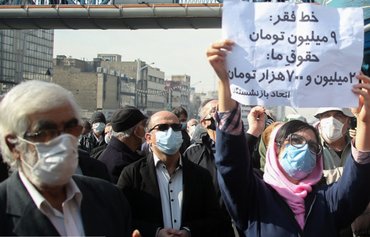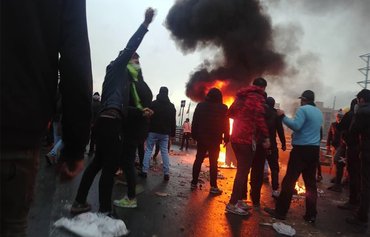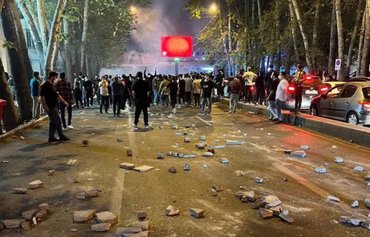Iran's recent attempts to suppress dissent and quash the news of anti-government protests reveal it is desperate to hide its internal instability as it tries to wield power elsewhere in the region, activists and academics said.
Demonstrators across the country from December 28th to January 1st protested the dire state of the economy, with many specifically opposing the Iranian regime's use of the country's resources to support its proxies and surrogates such as the Lebanese Hizbullah and the Syrian regime.
Twenty-five people were killed in the unrest, according to the authorities.
"Since the outbreak of the Islamic Revolution that overthrew the Shah [Mohammad Reza Pahlavi], the Islamic Revolutionary Guard Corps (IRGC) has sought to expand outside the Iranian borders," said Iranian human rights activist Haider Hamidi.
![Iranian protestors during the recent demonstrations in Tehran and elsewhere across the country. [Photo circulated on social media]](/cnmi_am/images/2018/03/05/11553-Iran-protest-youth-600_384.jpg)
Iranian protestors during the recent demonstrations in Tehran and elsewhere across the country. [Photo circulated on social media]
It has done this by attempting to export the revolution under false pretenses -- claiming it is supporting the oppressed -- and has succeeded in part in some Arab countries by recruiting Shia to fight for its causes, he told Al-Mashareq.
Now, however, the popular demonstrations and what they reveal about the poverty and deteriorating economic situation inside Iran "will undoubtedly undermine the IRGC’s credibility", he said.
"People will pose the question: How can you support the oppressed while you are oppressing and impoverishing your own people?" Hamidi said.
Many Iranians are living below the poverty line, he said, noting that the regime has been killing disgruntled youth for engaging in protests about their situation.
"The regional confrontations Iran is embroiled in, and popular clashes at home, both serve to weaken the IRGC and its expansionist dreams, so we see it trying, using all criminal means and methods that run contrary to human rights, to not only silence the voices of the opposition but also eliminate them," he added.
Concealing internal instability
"The IRGC recently found itself in a serious dilemma," said Abbas Mohammadi, who lectures at Tehran University’s faculty of law.
"While it is trying to portray itself as an invincible force outside the country, particularly in Syria, Iraq, Yemen and Lebanon, it is seeing the internal front beginning to falter," he told Al-Mashareq, using a pseudonym out of fear for his safety.
This is beginning to erode the sense of awe through which the IRGC tries to impose its control, he said.
The continuing demonstrations confirm Iran's internal instability and make it appear "weak", he said, which will undoubtedly undercut its regional ambitions and its dream of controlling the Middle East.
Therefore, he said, "we see the security authorities and all branches of the IRGC trying hard, in every way possible, to cover up the popular upheaval in various areas of Iran".
This is being done "through counter-propaganda that denies these facts, as well as the manipulation and cutoff of Internet services and blockage of social networking sites, which have become the most successful means of reporting events across the world by youth protesters", he added.
Blocking Internet services
Tehran University faculty of law student Zahra Dost Mohammadi told Al-Mashareq she has taken part in several protests in Tehran as part of university youth blocs.
"Despite the enthusiasm and courage that drive the protesters’ behaviour, there is a widely prevalent sense of trepidation over the possibility of being killed by the local or secret police," she said.
"The protesters are trying any way they can to avoid being arrested because they know full well the fate that awaits them in detention centres and prisons," she added.
The authorities are openly and publicly "trying to cut off communication among the Iranian people any time they detect any kind of opposition", she said.
They do this by cutting off Internet services, she explained, "either totally or by weakening them to the point of being ineffective, and from time to time they block the main social networking sites used by youth protesters".
The Twitter and Telegram social media platforms are regularly blocked, she said.
"In so doing, [the Iranian regime] has partially blocked internal communication and partially succeeded in blocking any information from being conveyed to the outside world," she said.
She described this as a "deliberate effort by the authorities to cover up what is happening in the Iranian street and society and to maintain its favorable image at all times to preserve its prestige".
'Excessive force against protestors'
"The ruling regime in Iran does not differentiate between an adult, a child, a young protester at the beginning of his life, an academic or an elderly man," said the lecturer, Abbas Mohammadi.
"All regime opponents are viewed equally and all face a grim fate," he said.
"The circumstances and level of awareness are different now, so suppression is the regime’s only solution to silence any opposing voice," he added.
The use of "excessive force against protesters and regime opponents resulted in the deaths of many activists and demonstrators", Hamidi said.
Activists have been working to ascertain the fate of thousands of detainees, a number of whom have died in prison, and expose the inhumane practices and conditions employed in prisons, he said.
The number of detainees who have died in custody is not known, he said, as news from the prisons and detention centres is very scarce.
"The detainees are deprived of their most basic legal, civil and human rights and denied permission to appoint lawyers or contact their families," he said.

![Iranians took part in a series of demonstrations to protest economic conditions in various cities across the country in late December and early January. [Photo circulated on social media]](/cnmi_am/images/2018/03/05/11552-Iran-youth-protest-600_384.jpg)






